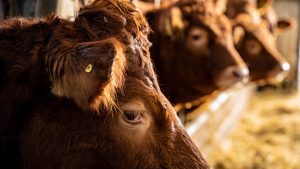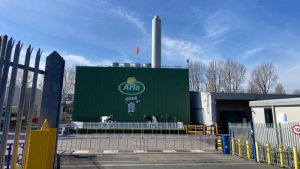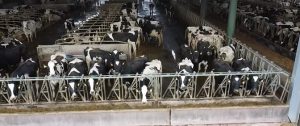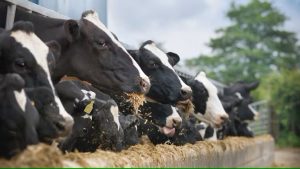
The dairy co-operative Arla Foods has announced it will pay its farmers more money for the milk they produce if they meet new environmental sustainability targets.
Arla is introducing the “sustainability incentive” with the aim of promoting and funding the reduction of emissions on the farms of its 8,900 members, based in the UK and six other European countries including Denmark, Sweden and Germany.
The goal is to help the co-op reach its target of reducing emissions on farms by 30% for each kilo of milk produced by 2030, and of reaching carbon net zero by 2050.
The launch of the incentive – which will be paid out to farmers from July 2023 – marks a big shift for the co-operative’s milk pricing model, linking the sum received by each individual milk producer to their sustainability efforts.
“The milk price Arla farmers will receive for their milk will not only depend on fat, protein and quality, it will also depend on their activities on sustainability,” said Arla’s chair, Jan Toft Nørgaard.
Arla members, including 2,300 British dairy farmers, will be able to access the extra payment by earning points based on the number of activities they undertake on their farms, according to the co-op’s models. Those who fail to improve their sustainability and collect below the average number of points will see a reduction in the money they are paid for the milk.
Farmers can collect points from their actions in different areas, including the efficient use of protein and fertiliser, animal feed, the delivery of manure to biogas production, and use of renewable electricity.
They will be able to receive 0.03 euro cents (0.02p) per kilo of milk for each point they achieve, up to a maximum of three euro cents.
At the scheme’s launch, producers will be able to collect a maximum of 80 points out of a future possible 100. The activities that could have the biggest impact on the climate and nature will carry the largest number of points.
For the average farmer – producing about 1.2m kilograms of milk annually – approximately €26,000 (£22,840) of the milk price will be based on their activities related to environmental sustainability.
“For farmers there is plenty of time for them to look at the model and what things they can do on farms,” said Graham Wilkinson, Arla’s vice-president for agriculture. About half of the available points are “where they can make changes relatively easily and relatively quickly without the need for significant investment”.
The incentive scheme comes as farmers face what Arla called “great uncertainty”, including soaring costs for fuel, animal feed and fertiliser, as well as chronic labour shortages.
Two years ago the co-op introduced a climate check scheme across 8,000 farms, allowing producers to earn an extra one euro cent for each kilo of milk they produce, by submitting climate check data. Most of Arla’s farmers (93%) have submitted this data.
As part of the scheme, farmers are visited each year to verify their figures, while they also receive suggestions on how to reduce their carbon footprint.
Arla said the additional payments from both climate schemes would correspond to approximately 7% of the milk price.
The co-op has previously identified six key areas responsible for the majority of emissions from milk production, including cows’ digestion, cow feed and how it is produced, the handing of manure, energy production and usage, emissions from peat soils and other areas.

























